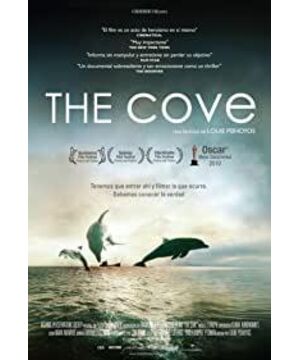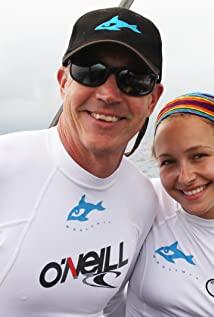The film shows the behavior of killing tens of thousands of dolphins every year in Taiji, a small fishing village in Japan. Almost every audience can't forget the cruel scene of blood red in the whole bay, and then makes a wish not to go to the aquarium to watch the dolphin show. At the same time, the film crew described the various hardships they had put in during the filming process, and came to the conclusion that dolphins should not be hunted from the perspectives of species, economic development, health concepts, traditional culture, etc.:
Dolphins are mammals with high intelligence, and Humans are similar and limited in number; protecting dolphins does not threaten fish production and fishery development as the Japanese claim; dolphin meat is highly toxic and harmful to humans; the Japanese nation does not eat dolphin meat as its officials claim At least most of the passersby who randomly surveyed on the roadside do not know about it...
But the Japanese have never given up this "hobby", at least since they had sampans in the 1930s.
In 1986, after the International Whaling Commission (IWC) banned whaling for commercial purposes, Japan continued to hunt under the banner of "research". The only change was that all whaling ships were marked "RESEARCH" ) characters. For the whale meat that is publicly sold on the market, the Japanese side claims that the proceeds from the sale will be used as research funds. Just on January 6 this year, the Japanese whaling ship "Second Shonan Maru" collided with the speedboat of the international "Sea Shepherd Association", which aroused strong condemnation from environmental protection organizations in various countries.
Regardless of whether scientific research needs to slaughter tens of thousands of people, Japan's whaling program has rarely produced any results. Scientific research is untenable, but its ocean-going whaling industry continues to grow. At present, Japan has 1,000 whaling ships and 100,000 workers in the Pacific region alone, and has six whaling bases including Taiji Town.
However, interpreting it as a purely economic act is also unconvincing. In the film, the protagonist of the documentary tried to pay Taiji fishermen a certain fee every year to urge them to stop hunting, and Japanese officials still only shook their heads.
The discussion has progressed to this point, and the Americans are going crazy, and finally they have to give an answer that they probably don’t quite believe: “This has nothing to do with the economy, or even politics, it’s just the so-called Great Japanese Empire’s thinking. The remnants are at work. They are fed up with Western countries, fed up with what they are instructed to do, how to do it, and when to do it."
Whether dolphins should be killed or not involves the concepts that the Western world has always advocated, such as animal welfare, species equality, and environmentalism. . Some viewers questioned, if the Japanese should not kill dolphins, should Koreans also reject dog meat and Americans should reject beef? Is it unfair to other species if dolphins should be protected simply because of their intelligence and popularity? According to this logic, is it going to be extreme enough to advocate global vegetarianism?
What's more, the debate on the topic has risen to nationalist heights. It is said that after the film was awarded, some Japanese protested against Americans for insulting their national traditions, which is exactly the same as the common "Western insults China" argument. If any topic is mixed with the label of "traditional culture", it will no longer be clear, but this does not mean that others have no right to express their opinions.
Some people use the idea that documentaries should objectively and truthfully reproduce what happened, and accuse the film crew of only selecting material that is beneficial to them. For example, most of the Japanese officials, scientists, and fishermen in the film are complicit in their stupid faces, as if no one has ever had a moment of rational thinking. Another example is the random interview of passers-by. Who knows how many failed attempts have been made to express the most conducive to the theme of the film?
There is nothing wrong with these actions. The so-called objective truth does not exist in the first place. No matter how to balance the viewpoints, what is displayed in front of the audience must be the main creative image. As big as the logic of the entire film, as small as the arrangement of each camera, how can there be anything without the creator's preset?
Whether it is documentaries, documentary photography or news reports, it is too demanding to be purely objective, bystanders, and outsiders. It is true that the audience needs to reach a conclusion that is relatively close to the truth through different factual aspects, but these do not necessarily require all of them to be presented in the same work. As long as the whole environment allows a variety of sounds to come out, it is enough to form a balance of the whole from different viewpoints on a large scale.
From the point of view of operation technology, "Dolphin Bay" is well-deserved. Its excellence lies precisely in its "bias", forming a fast-paced context with a large number of well-organized and rationally interspersed materials, using a lot of montage techniques, rather than showing its truth like traditional documentaries, and honestly follow the sequence of events. "If you hear it, it will be recorded." The result in this way is indeed a "subjective judgment", but those who hold other opinions can follow suit or speak out, and it is up to the individual viewer to accept which point of view.
As the film's distributor in Japan declared: "Our release of Dolphin Cove does not mean that we are partial to any party, we just hope that the film will be shown to Japanese audiences, so that they can distinguish right from wrong. Now there is a debate, and this film The importance of movies is also unquestionable, and winning an Oscar shows that. The release of the film provides a platform for this debate.”
The inspiration of “Dolphin Cove” for Chinese documentaries is that too many creators still don’t know how to talk about it. story. Even though some topics have occupied the moral high ground, and even if the parties involved have made more active and effective participation, the creators simply believe that the content itself is enough to move people, and any image will be presented in the crudest original form. In fact, this last step, which seems to be the icing on the cake, is the packaging process that has the greatest dissemination effect.
Of course, there is another layer of institutional obstacles in the country that everyone has to use as a shield of refuge. Driven by conscience, many powerful documentary creators focus on topics that are difficult to enter mainstream channels - in fact, whether you focus on poverty, disease, homeless or animal hunting, any content that is slightly difficult will inevitably be discussed in depth. Stepping into sensitive areas makes it impossible to spread on a large scale. In this sense, attaching importance to the means of telling and abandoning traditional concepts has become a lesson that must be learned.
View more about The Cove reviews









